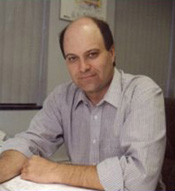
David R. Harding
Senior Scientist, Laboratory for Laser Energetics
Professor of Chemical Engineering (secondary appointment)
PhD, Cambridge, England, 1986
- Office Location
- 250 East River Road
- Telephone
- (585) 275-5850
Recent Publications
Harding, D.R.; Bonion, M.J.; Sweet, W.; Schoff, M.; Greenwood, A.; Satoh, N.; Takagi, M.; Nikroo, A., "Properties of Vapor-Deposited and Solution-Processed Targets for Laser-Driven Inertial Confinement Fusion Experiments," Matter and Radiation at Extremes, 2018, 3, 6, 312-321.
Chock, B.P.; Harding, D.R.; Jones, T.B., "Using Digital Microfluidics to Dispense, Combine, and Transport Low-Surface-Energy Fluids," Fusion Science & Technology, 2018, 73, 2, 237-247.
Viza, N.D.; Harding, D.R., " Performance of Different "Lab-On-Chip" Geometries for Making Double Emulsions to Form Polystyrene Schells," Fusion Science & Technology, 2018, 73, 2, 248-257.
Goncharov, V.N.; Regan, S.P.; Campbell, E.M.; Sangster, T.C.; Radha. P.B.; Myatt, J.F.; Frouls, D.H.; Betti, R,; Boehly, T.R.; Delettrez, J.A.; Edgell, D.H.; Epstein, R.; Forrest, C.J.; Glebov, V.Y.; Harding, D.R.; et al, "National Direct-Drive Program on OMEGA and the National Ignitions Facility,' Plasma Physics and Controlled Fusion, 2017, 59, 1SI (Special Issue).
Harding, D.R.; Whitaker, D.; Fella, C., "Growth of a Solid D-T Crystal form the Liquid Inside Inertial Confinement Fusion Targets," Fusion Science and Technologyy, 2016, 70, 2-173-183.
Bernat, T.P.; Petta, N.; Kozioziemski, B.; Harding, D.R., "Zinc-Nucleated D-2 and H-2 Crystal Formation from their Liquids," Fusion Science and Technology, 2016, 70, 2-196-205.
Research Overview
My research is defined by a specific application: development of a suitable fuel for nuclear fusion, specifically, inertial confinement fusion. This effort requires research in several technical disciplines: vapor deposition and microfluidics, technologies that are used to make polymer capsules that contain the fusion fuel; and cryogenics and condensed matter physics, to study the crystal-growth mechanism, structure and properties of the deuterium-tritium fusion fuel. An emphasis of this research is to scale current technologies for mass production, to support an inertial fusion energy program. The most challenging aspect of this work is to determine how to deliver the cryogenic fuel, which is at a temperature of -255oC, into a reactor where the temperature will be over 5000oC, without affecting the fuel!
Research Interests
- Cryogenic Properties of Solid Deuterium and Tritium
- Thin-Film Deposition
- Microfluidic Processes
